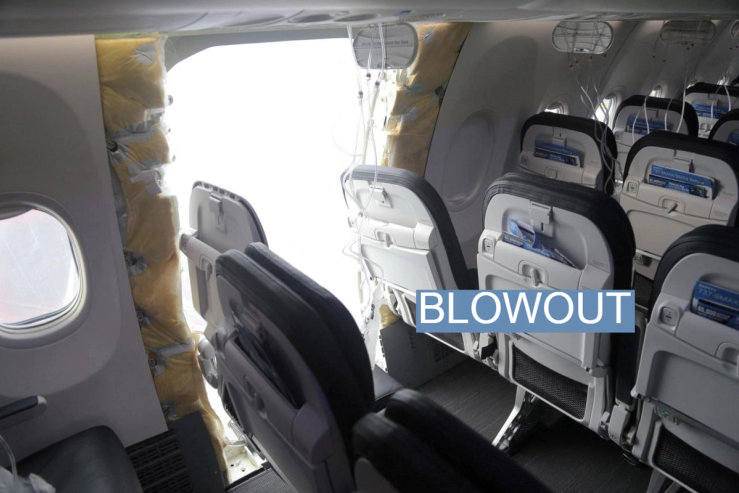The News
The U.S. Federal Aviation Administration has launched a formal investigation into Boeing’s safety compliance with its 737-9 MAX aircraft after the midair blowout of a panel on an Alaska Airlines flight on Jan. 5.
“This incident should have never happened and it cannot happen again,” the FAA said in a statement, adding that the “safety of the flying public, not speed” will determine when then aircraft can return to service.
The FAA said the investigation will determine if Boeing “failed to ensure completed products conformed to its approved design and were in a condition for safe operation in compliance with FAA regulations.”
Alaska Airlines and United Airlines said they have found more 737s with either loose hardware or bolts in the assembly of door plugs on their aircraft. Boeing CEO Dave Calhoun said the company was “acknowledging our mistake” during a town hall meeting.
SIGNALS
Will the 737 MAX’s reputation recover? Experts are unsure
Airlines are “keeping the faith” in the bestselling 737 MAX because this specific aircraft has had no other major safety issues, and the latest incident is unlikely to be a “major crimp” in production, one aviation analyst told USA Today. The decision for airlines to quickly ground the aircraft will “result in safer skies in the long term,” once inspections are completed and the issue of loose bolts resolved, according to tourism news site TravelPulse. Even so, the door incident shows that Boeing failed to properly oversee production, and the company’s executives may worry “about what other shoes may yet drop on this family of aircraft,” wrote aviation journalist Zach Wichter.
Boeing still pushing for safety exemptions despite fatal 737 crashes
The FAA will face “tough questions” from lawmakers at a February hearing to determine whether a lack of oversight led to the panel blowout.” The regulator has faced scrutiny over its role in two 737 crashes that occurred in 2018 and 2019, killing 346, with subsequent reports detailing how the FAA acquiesced to Boeing’s request to forego pilot training on the aerodynamics system that ultimately downed the two planes. Yet Boeing is still pressuring the FAA to relax safety requirements, the Seattle Times reported: after the regulator found defects in the 737’s engine anti-ice system that it said could result in loss of control of the airplane, instead of grounding the aircraft, the FAA approved an interim solution that requires pilots to turn off the anti-ice system temporarily. Boeing is now asking the FAA to have its newest 737 model exempted from the safety regulations. Pilots say the stopgap measure is inadequate. “You get our attention when you say people might get killed,” one said.
Outsourcing plane construction could lead to safety issues
Employees at Spirit AeroSystems, the subcontractor hired by Boeing to build the door plug, had raised numerous safety concerns but were told to falsify records to underreport defects, according to a federal complaint brought by shareholders. While it remains unclear exactly what caused the door failure — Spirit’s construction or the installation by Boeing — the complaint alleges little FAA oversight on Spirit, which is the result of a “chronic, systemic, and longtime funding gap,” one aviation analyst told Jacobin, a socialist magazine. Production issues are not limited to the door plug: the federal complaint alleges Spirit knew about a separate defect — bulkhead holes that weren’t drilled properly — for months before the information became public last August. In that case, the FAA found there was “no immediate safety concern” and ruled against expanding a preliminary investigation into Spirit.



